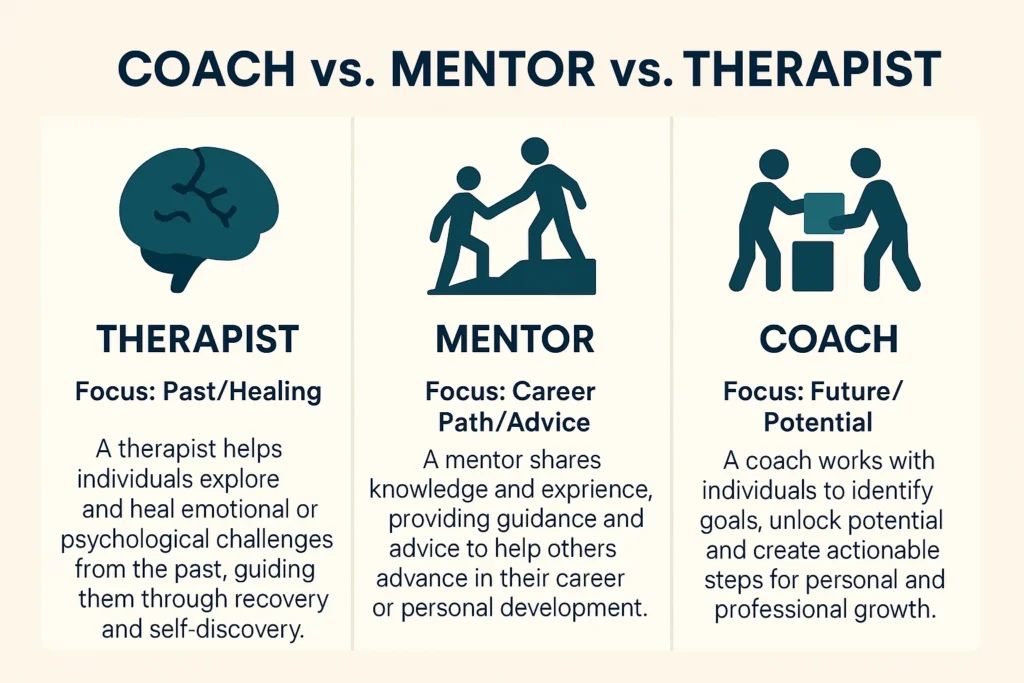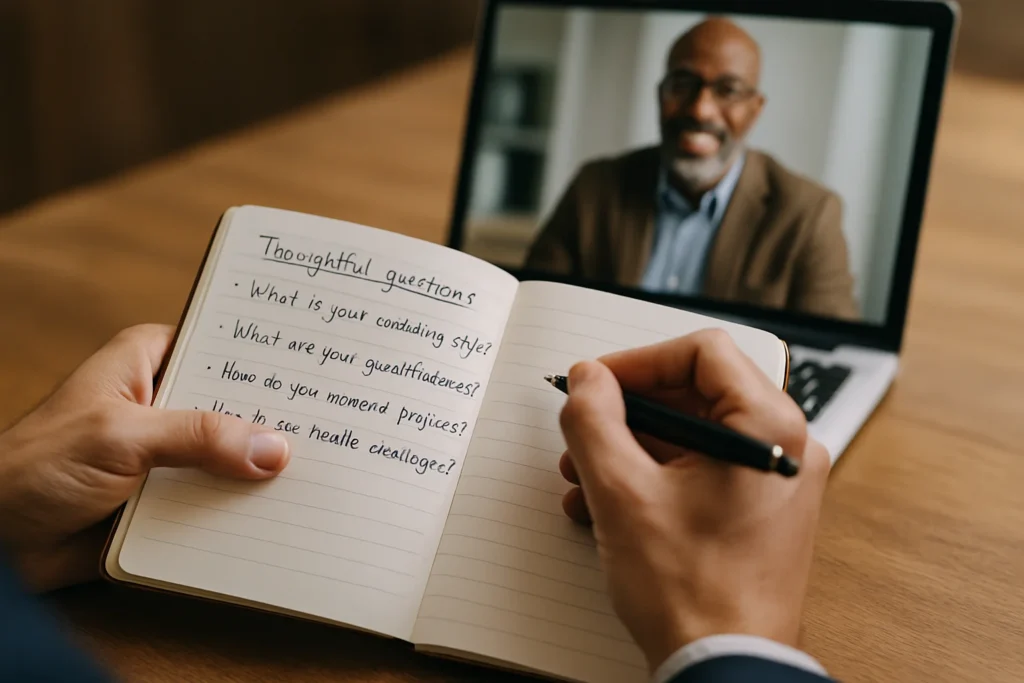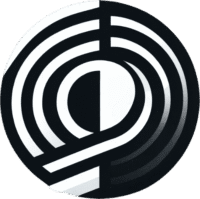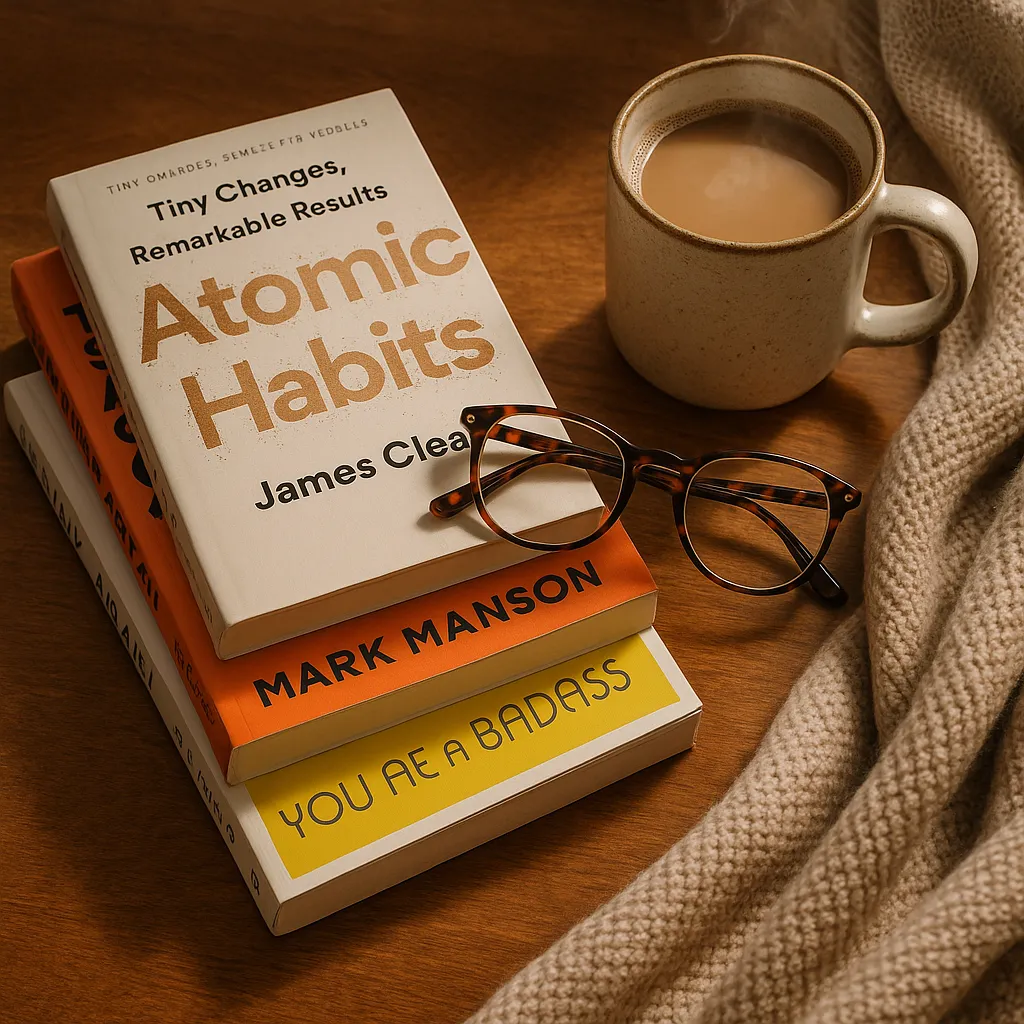
Elite athletes have coaches to push them to peak performance. CEOs have advisors to help them navigate complex business landscapes. World-class musicians have teachers to refine their craft.
So, why should you navigate the most important journey of all—your life and career—alone?
This is where a personal development coach comes in. But in a world of endless online experts, the coaching industry can feel noisy and unregulated. How do you find a high-quality professional who can genuinely help you, and avoid the ones who just sell hype?
This guide is your filter. We will give you a simple, 4-step framework to find, vet, and choose the right personal development coach for you, ensuring that your investment of time and money generates a real, tangible return on your growth.
What Does a Personal Development Coach Actually Do?
Before you can find a great coach, you need to understand what they do—and what they don’t do.
Coach vs. Mentor vs. Therapist: A Clear Distinction

These roles are often confused, but they are fundamentally different.
| Role | Focus | Primary Function |
| Therapist | Past & Present | Healing emotional wounds and treating mental health conditions. |
| Mentor | Present & Future | Sharing wisdom and experience from their own specific career path. |
| Coach | Present & Future | Partnering with you to unlock your own potential and achieve your specific goals. |
A therapist helps you heal. A mentor gives you advice. A coach asks powerful questions to help you find your own answers.
The Core Benefits of Having a Coach
A great coach is an investment in yourself. The primary benefits include:
- Clarity: They help you cut through the noise and get clear on what you truly want.
- Accountability: They are a dedicated partner who will hold you accountable to your commitments.
- Perspective: They offer an objective, outside perspective to help you see your blind spots.
- Acceleration: They can dramatically accelerate your progress, helping you achieve your goals faster than you would on your own.
The 4-Step Framework for Finding Your Ideal Coach
Follow this structured process to move from “I think I need a coach” to “I’ve found the perfect partner for my growth.”
Step 1: Define Your Goal (What Problem Are You Solving?)
This is the most important step. You don’t hire a “coach”; you hire a coach to help you solve a specific problem or achieve a specific outcome. Before you start your search, get clear on your objective.
- Are you trying to navigate a career transition?
- Do you want to become a more effective leader?
- Are you struggling with procrastination and time management?
- Do you want to build your self-confidence?
Knowing your goal will allow you to find a coach who specializes in that exact area.
Step 2: Research and Create a Shortlist
Once you know what you’re looking for, it’s time to find potential candidates.
- Where to Look:
- Certifying Bodies: The International Coaching Federation (ICF) has a searchable directory of credentialed coaches. This is a great place to start to ensure a baseline level of professionalism.
- Your Network: Ask trusted colleagues or mentors for recommendations. A personal referral is often the best source.
- LinkedIn: Search for coaches who specialize in your area of need and see who is respected in your industry.
- Your Goal: Create a shortlist of 3-5 potential coaches to interview.
Step 3: The Discovery Call (The Interview)
Almost all credible coaches offer a free, 15-30 minute “discovery call” or “chemistry call.” This is not a sales call; it’s a two-way interview. You are interviewing them just as much as they are getting to know you.
Your goal is to understand their process and, most importantly, to see if you connect with them.
Step 4: Check for Chemistry and Trust Your Gut
Credentials and experience are important, but the single most critical factor in a successful coaching relationship is chemistry. Do you feel comfortable with this person? Do you trust them? Do you feel they genuinely understand you?
If your gut is telling you it’s not a good fit, listen to it, even if the coach looks perfect on paper.
10 Essential Questions to Ask a Potential Coach

Use your discovery call to get the information you need. Here are 10 powerful questions to ask:
- “What is your coaching methodology or philosophy?” (Are they structured and data-driven, or more intuitive and holistic?)
- “What is your training and what certifications do you hold?” (Look for reputable certifications, like those from the ICF.)
- “What type of clients do you typically have the most success with?” (Do they have experience with people in your industry or with your specific problem?)
- “Could you share a (confidential) example of how you helped a client with a similar challenge?”
- “How do you structure your coaching engagements? What does a typical session look like?”
- “How do you measure the success of a coaching engagement?”
- “What will you expect from me as a client?” (A great coach will expect you to do the work.)
- “What are your rates, and what is included in your packages?”
- “What is your policy if we find we’re not a good fit after a few sessions?”
- “What is one book you would recommend I read?” (This gives you insight into their thinking.)
Red Flags to Watch Out For
The coaching industry is unregulated, so it’s important to be a smart consumer. Watch out for these red flags:
- Guaranteed Results: A credible coach knows that your results depend on your effort. Be wary of anyone who “guarantees” a specific outcome (e.g., “I guarantee you’ll double your income”).
- Lack of Credentials: While not all great coaches are certified, a lack of any formal training can be a warning sign.
- High-Pressure Sales Tactics: A discovery call should feel like a supportive conversation, not a used-car negotiation.
- They Talk More Than They Listen: If the coach spends the entire call talking about themselves and their own successes, they are not a good coach. A great coach makes the conversation about you.
Conclusion: The Ultimate Investment in Yourself
Finding the right coach is one of the most powerful accelerators for your personal and professional growth. It’s an investment in a partner who will provide you with the accountability, perspective, and strategic guidance you need to reach your goals faster and more effectively.
A great coach will help you build a powerful plan. Get a head start by using our Free Professional Development Planner Tool to map out your goals.
And for more resources you can use on your journey, explore our complete guide to Essential Resources & Tools for Self-Development.


